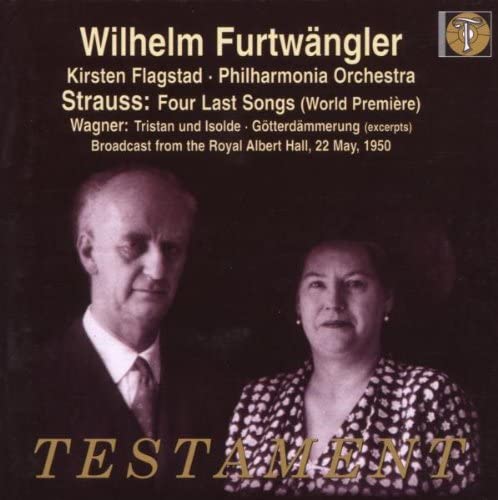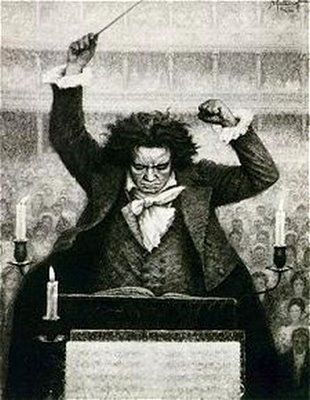Valued label founder dies, 69
OrchestrasThe Testament label is cherished for bringing back 1950s performances that were thought to be lost.
Possibly the most cherishable was the world premiere of Richard Strauss’s Four last Songs, sung by Kirten Flagstad at the Royal Albert Hall, with Wilhelm Furtwängler conducting.
Almost as treasurable is the Klemperer Fidelio from Covent Garden, far superior to the subsequent EMI cast.
And much more.
Stewart Brown, the label founder, has sadly died.
Rob Cowan writes:
To think that Stewart Brown, one-time clarinettist, property entrepreneur, loving family man, generous friend to many and founder of the Testament CD label, has died at the all-too-young age of 69, is to ponder the passing of yet another serious game-player in the world of classical music recordings. So few of them are left now, people whose knowledge and experience of so-called ‘back catalogue’ reaches far enough into the mists of time to recognise – and revivify – long-lost treasures. Stewart was special in so many ways. A canny businessman with a conscience, copyright-wise, he’d befriend major critics and commentators regarding what best to reissue, then approach the relevant cd companies and musicians’ families to enquire about royalties due and the availability of original tapes/acetates (from what was EMI [now Warner Classics], RCA, radio tapes, etc). Stewart was scrupulously honest: where dues were owed, they were paid in full. Everything was upfront and because of that he won the respect not only of connoisseurs but of publishers, record labels and dealers, company executives and of course musicians who pounced on his releases – far too many to list in detail – as if they were manna from Heaven.






Indeed, one of the most valued of labels. May Stewart Brown Rest in Peace.
Very sad news. Testament is an outstanding venture and I do hope that it will continue its sterling work in providing superb remasterings of the finest performances of the past.
And 69 is not exactly old age.
The Keilberth Ring is another of those invaluable treasures that Mr. Brown has recovered.
RIP.
I’m ashamed to say that, despite more than 50 years of buying classical music recordings, this label was unfamiliar to me. I shall investigate.
RIP and thanks in advance for what I hope I am about to discover.
Very interesting catalogue patiently built. A lot of great performances, a genuine connaisseur, I was never impressed by the remastering though, especially for studio recordings. I was told the vinyl editions were very good. I enjoyed the Svetlanov Berlin philharmonic cd, more recently a Copland concert or some Karajan lives….The record market does not expand….
I never knew that the person who ran Testament was younger than I am, and it isn’t a great feeling to know that this young person is dead. I am a huge fan of this label — and unlike the Symposium label which had somewhat similar aims, Testament CDs had not just quality content but highly professional looking covers, program notes, and information.
This is a real loss. The thing about Testament, and thus about Stewart Brown, is that he didn’t just know about “back catalogs” and brought wonderful things back, but he also knew, or sought out those who knew, about what was unreleased in the vaults and brought it forth. Thus we have Cantelli’s sadly incomplete Beethoven 5th on Testament, filled out with Mendelssohn’s “Italian” and a Rossini overture, in good sound for the era. True it was known that Cantelli had started it but tragically died — but I don’t think it was generally known that three movements were note complete. It’s sad to learn that the recording session was halted due to construction noise next door and that it was assumed at age 36 that of course the conductor would always be around to finish it propertly.
Another example is the Testament CD (SBT 1028) of the Mozart Concertos Nos. 3, 4 and 5 with violinist Szymon Goldberg soloing with the Philharmonia under Susskind in 1951. The concertos Nos. 3 and 4 were known to collectors of vinyl who were delighted to see them back on CD — unlikely that EMI would reissue them due to the mono sound — but the surprise was that Goldberg had recorded a marvelous A Major “Turkish” that had been languishing in the vaults evidently due to lack of a disc mate! Testament had no fetish about stereo sound and since they mined the EMI vaults so heavily, perhaps realized that in some cases the early EMI stereo was a bit of a step backward in actual sonic quality compared to the best of their monaural but nonetheless “high fidelity” offerings. But the market today really wants that stereo regardless of actual sonics.
Perhaps the most valued of the Testament reissued were those of the Hollywood String Quartet, recordings perhaps originally undervalued or downplayed because of that shabby word “Hollywood” (and yes indeed they recorded with Frank Sinatra, but memorably so), but string players knew just who these musicians were and the true connoisseurs easily looked past that name for the glorious interpretations. I’d give first priority to Testament SBT 1031which has the HSQ joined by Kurt Reher and Alvin Dinkin in Arnold Schönberg’s Verklärte Nacht, and by Reher in the Schubert C Major Quintet. This is string playing that has to be heard to be believed.
Another extremely interesting recording, and again one unlikely to be revived by EMI itself, was David Oistrakh and Soviet colleagues in the Schubert Octet. The clarinet, bassoon and horn parts just “don’t sound this way” in recordings with Western European, British, or American players. Testament SBT 1114. But my Fanfare review was a bit harsh because they filled it out with Oistrakh’s recording of Tartini’s “Devil’s Trill” Sonata (one of Oistrakh’s best “showpieces” as those who know his Soviet recordings can — no pun intended — testify), but snipped off the opening movement because the disc was over 71 minutes, never mentioned in Tully Potter’s otherwise exemplary notes.
So here’s a toast to Testament and to Stewart Brown’s memory.
Agree with all the above, but, “over 71 minutes”? CDs are capable of 80 minutes, and sometimes a bit more!
Truly a bitter loss!
Stewart, who was also a “trained” clarinettist, not only had a great understanding of music and musicians, he also had an unerring sense for “treasures” that were either no longer available on the market or had never been released.
His most sensational find was perhaps Wagner‘s “Ring des Nibelungen” with conductor Joseph Keilberth (an early stereophonic recording from 1955), which was honoured with the “Preis der deutschen Schallplattenkritik” (German Record Critics’ Award) and also attracted great interest and worldwide recognition. But we also owe him rarities such as the release of Mahler’s Tenth Symphony in two performance versions by Deryck Cooke. What is special about this 3 CD box set is that not only two recordings conducted by Berthold Goldschmidt (with the Philharmonia Orchestra and the London Symphony Orchestra) are presented, but also Cooke’s “BBC talk” about Mahlers Tenth from 19 December 1960.
Not to be forgotten: Stewart has released recordings of the Berlin Philharmonic Orchestra over a number of years, which until then were usually only stored in the archives as concert recordings. Worthy of mention are “legendary” interpretations of Mahler’s Second, Third and Sixth Symphonies by Sir John Barbirolli, who introduced the Berlin Philharmonic to Mahler’s music, which was not allowed to be played during the years 1933-1945, against reservations and misunderstandings; a series of concert recordings conducted by Carlo Maria Giulini and Klaus Tennstedt – but also an extraordinary rarity: recordings of the orchestra’s very first post-war conductor, Leo Borchard, from the 1930s. Borchard had made himself unpopular during the Nazi era, his career stagnated, and later he worked in the resistance against the Nazi regime. As an artist and as a political person, he was particularly suited to shape a new beginning with the Berlin Philharmonic. Unfortunately, he was shot by a US soldier in August 1945 while entering the American sector of Berlin.
Stewart was on fire for the music and his projects. With him we have lost a likeable, amiable, witty and cheerful person, a fair and reliable partner.
Helge Grünewald, Berlin
Helge, how nice to hear from you!
Norman, nice to hear from you and nice to read the obituary for Stewart, who was a good friend over some 15 years for me. And I supported him in releasing interesting concert recordings of the Berlin Phil.
By the way: You are always present for me. Now especially, since I work as an dvisor for Christian Berger’s documentary “Der Klang der Diktatur”. I found the interview with you very interesting. Especially what you said concerning Furtwängler. I am the president of the German Furtwängler Society, And as we both know there is a (never ending) discussion about his “behaviour”, his role during the years 1933-45. I would like to meet you again – maybe in London (I have not been there for about 5 years) or in London. Let’s keep in contact.
Herzliche Grüße
Helge Grünewald
Let’s do that…. it has been too long.
A kind and generous friend – also to the late Charlie Rodier of EMI. Stewart took up many of my suggestions of EMI material when the label began and most notably the recordings of Cantelli like the truly exceptional and brilliant Mendelssohn “Italian” & Dukas “Sorcier”.
Like Graham Pauncefort (CRD) he was on my list of things to do after my return to UK – and here again I was too late (but the “pox” made it rather difficult).
Sorry, but it was not Barbirolli “who introduced the Berlin Philharmonic to Mahler’s music”. At one point the orchestra had a database / archive of its concerts. If one searched it, it would have seen that a number of works such as the first or fith symphony, Das lied, or song cycles entered the repertorie of the orchestra soon after the war. From my memory, such conductors as Cluytens, Rosbaud or Jochum lead the Berliners in Mahler in that era.
Even the third symphony was not introduced by Barbirolli to the Berliners in the post-war years. Constantin Silvestri did it in the early 60s, with actually the same soloist: Lucretia West. I would love to hear this performance.
This is not to deny the value of Barbirolli’s appearances with the orchestra, not his role in popularizing Mahler (though lets note that while he was music director of the New York Philharmonic the only Mahler piece he conducted has the Adagietto from the fifth symphony. He did however lead the 1st and 9th symphonies when he returned as a guest conductor after the war). But he did not introduce Mahler in Berlin.
A fine series of tributes for a lamentably early loss. I also prized the label for its dedication in releasing complete sets wherever it could, often by way of single CDs so that you could pick and choose rather than the enormous unwieldy retrospective boxes that keep appearing these days. For example, and it is only an example, the complete run of Solomon’s Beethoven sonatas. Or, as Mr Nelson mentions, all the Hollywood Quartet recordings of the period.
I remember Stewart as fun, generous, great company and a thoroughly nice chap. Both in business and after hours.
I can’t add more to what Rob and others have said. I first met Stewart in 1990 when I was at EMI and he was setting up Testament and trying to license EMI titles for the label. We happened to be close neighbours in Bromley so I visited him at home with his wife, Sarah, on numerous occasions and as others have mentioned, he was always charming and very generous. Much later, when I was involved with BBC Legends and then ICA, we enjoyed some friendly rivalry competing for licenses with the BBC and other broadcasters. I think he beat us to it – he got some titles notably from Berlin and that ‘Ring’ of course! I telephoned him just over three weeks ago and was deeply saddened about his on-going ill health. Stewart was a consummate professional and a natural ‘record’ man. A natural racoteur. He will be greatly missed by an industry who need people of his calibre and knowledge.
I never actually met Stewart although of course I always regarded him as one of the finest people in our business. If he released something on Testament that was enough of a guarantee that it deserved our attention. He earned the gratitude and admiration of so many of us.
We did have contact over his reissue of those miraculous Peter Maag Mozart recordings, which have a permanent place in my otherwise floating Desert Island list. As I recall, he found out that I had produced a recording with Maag in Bern (in Tony Faulkner’s safe hands!) and invited me to write the CD booklet note for the Mozart disc. It was a very special assignment for me.
I always intended to ask Ray Minshull why Maag did not make more recordings for Decca, but never got round to it. Ho Hum . . .
PS Mendelssohn: Symphony No.3 / Hebrides, LSO in Kingsway Hall – another Maag treasure!
John Kehoe